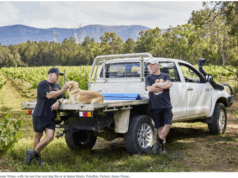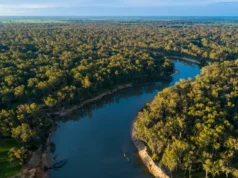
Photo credit: Matthew Abbott
End of the road. From his dairy farm in New Zealand’s North Island town of Te Kuiti, this is as far south as Daniel can drive before he runs out of land. He sits with his wife Rebecca in their car at Houghton Bay on Wellington’s south coast, five and half hours from home, and watches the waves from Cook Strait flop onto the caramel sand. Evan, 9 and James, 4, don’t seem to notice the biting Wellington wind and play on the rocks higher up on the beach. To their right is Tarakena Bay, where the rugged hills that rear from the sea bear remarkable resemblance to the landscape of Gallipoli. It might be serendipitous, but the ANZAC spirit lives deep inside Daniel, 41, in ways he could never have imagined. In the distance is the South Island, the Kaikoura Ranges weighed down under a cloak of snow. Tomorrow they’ll catch a ferry there and drive wherever they damn well please, because this holiday is a celebration of freedom. It’s his first holiday unshackled from the burden of dialysis; his first holiday since an anonymous Aussie donated a kidney so that he could finally be the father to his boys that he always wanted to be. This holiday is for Rebecca and them.
Rebecca holds his hand, that incredible, capable woman who fell in love with him 15 years ago when he was healthy, who stuck by him when he got sick, and who rushed him to hospital six years ago on her 35th birthday, when she thought she might lose him. “He was vomiting out the car door,” she says, remembering the day Daniel’s first kidney transplant packed it in. “He should have been on dialysis earlier.”
She turns to Daniel, gently scolding him. “You pushed it too far, aye?” Daniel nods. “I was quite sick.”
Daniel had suffered from kidney problems since he was a toddler and by his late teens the situation was dire. That was when his dad gave him the greatest 21st gift a dad could give his son: a kidney. But when that kidney wore out after eleven years, and with no compatible family members who could help a second time the only thing that could save Daniel’s life was dialysis. So began six years of scheduling life around a thrice-weekly three-hour artificial blood cleansing machine hook-up. Six years on the waiting list for a deceased donor’s kidney, with no guarantee a compatible match would ever come up, or that his name would reach the top of the list. The end of independence, end of family holidays like this. End of the road…
Read the full story here


